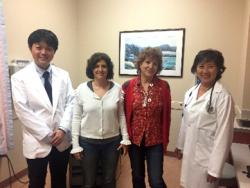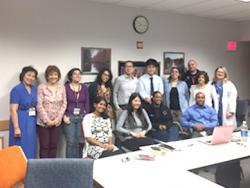International and Domestic exchange
Shinya Tsuruta (6th grade)
Robert Wood Johnson Medical School Study Abroad Report
During my 6th year, I chose to do an overseas clinical internship at Rutgers Robert Wood Johnson Medical School. While many medical students start to study for the national exam in earnest when they reach their 6th year, it was a difficult decision to choose to spend a very precious month of April in my 6th year studying abroad in the United States. However, in my 4th year, I had the opportunity to interact with Professor George, who came to Japan for Professor Morimoto's clinical statistics class, and in my 5th year, my classmates Hyogo Medical University of Medicine and my high school classmates studied abroad in the United States. This made me very interested in medical care and life abroad, and I thought that if I spent the rest of my life suppressing this feeling, I would end up regretting it, so I made this decision.
During this internship, I stayed with Dr. Lin, a Taiwanese-American professor of Family Medicine at the Rutgers Robert Wood Johnson University Hospital in New Brunswick, New Jersey, for two weeks, and with Dr. Nithya, an Indian-American resident, for two weeks, and studied at Family Medicine for one month. With my limited knowledge at the student level, I had no idea what Family Medicine was, which in Japanese would be family medicine. Because of that, everything I experienced at Family Medicine during this internship was fresh and it was a very good opportunity. Primary care, a concept that has been spreading widely in Japan in recent years, is often mainly performed by Family Medicine, whereas in Japan the general image is that of private practice physicians.
The Family Medicine department at Robert Wood Johnson University Hospital was roughly divided into two teams. Each team had several residents in their first to third year after graduating School of Medicine, including Spanish, Chinese, and African American residents, and the ratio of white doctors was about half and half, which gave me a sense of America being a melting pot of races. I did my internship in Professor Lin's team, but since Rutgers University is a comprehensive university, students from School of Pharmacy at Rutgers University also did their internship in the same team.
Most of the first week started with a conference at 7am. The conference room was in the hospital cafeteria, and the atmosphere was casual as we ate breakfast purchased from the cafeteria. When the professor was busy, the resident doctor would put his cell phone on speaker and let the professor participate in the conference remotely, a scene that I rarely see in the Japanese medical field as far as I know. What surprised me about my ward training was that Family Medicine even examined newborns and pregnant women. This made me realize that it is not completely synonymous with general medical practice in Japan.
Between ward training, I also participated in classes on the campus of Rutgers University School of Medicine, a 15-minute drive from the university hospital, where first- and second-year students study (American School of Medicine have a gap with Japan, as students enter after graduating from college). There, former drug addicts and homeless people were invited to participate in group learning. This is a type of education that is rarely seen in Japan, and it was a very stimulating experience.
During the second and third weeks, I moved house due to Dr. Lin's convenience, and commuted to the university hospital from Dr. Nithya's house. During the second week, I mostly participated in a boot camp for students from Rutgers University School of Medicine. The boot camp was like a preclinical education at Hyogo College of Medicine, where doctors who are actually active in the clinical field taught topics in their fields of expertise to small groups of medical students. Among the several boot camps, I was particularly impressed by a class in which students solved a case of upper gastrointestinal bleeding using a doll whose vital signs such as electrocardiogram and respiratory status fluctuated when operated on a PC, and performed cardiopulmonary resuscitation along with a sudden change in vital signs. Students are faced with a sudden change while making a differential diagnosis while taking a medical history, so they are required to respond flexibly. It was a very clinical and meaningful class. Also, on the second Thursday, a city hall employee who was an acquaintance of Professor Lin showed us around New Brunswick, where we learned about Fukui City, which is a sister city of New Brunswick, and about a Japanese person studying at Rutgers University, broadening our horizons beyond medicine.
During the third week, I often had the opportunity to practice at the Chandler Clinic, a branch of Family Medicine at Robert Wood Johnson University Hospital, which caters to low-income people without insurance. Most of the patients who come here are Hispanic or Arabic, and because of the language barrier, the doctors had a hard time conveying things that patients needed to understand, such as the importance of dietary management and taking medication for diabetes. However, to my surprise, the hospital had an interpreting service for each country at all times. This is also unique to America, a country of immigrants. Since Japanese people feel a language barrier even with English, the world's official language, I felt that the importance of services like the Chandler Clinic should not be overlooked in Japan, which is becoming a super-aging society and where the need for serious discussions on immigration is increasing.
On the other hand, just as Obamacare, which was introduced as a way to make private insurance mandatory due to the widespread use of private insurance, is now being forced to be abolished by Trump, I felt that Japan's universal health insurance system is a wonderful system compared to the unstable American health insurance system.
During the second and third weeks, I had relatively more free time, so I was able to enjoy my free time by going to New York and Philadelphia with students I had met at Rutgers University. In particular, watching an MLB game with enthusiastic local fans is an unforgettable memory for me. One of the students from the School of School of Pharmacy at Rutgers University was part of the Japanese science community in New York, so I volunteered to go to New York to teach abdominal ultrasound to children. I was reminded of the importance of meeting people.
In the fourth week, I had the opportunity to train in a building dedicated to Family Medicine, where I actually took medical history and physical examinations with students. Here too, I was amazed at the breadth of Family Medicine's scope, which includes performing skin biopsies in outpatient clinics, and the high level of medical history-taking ability of American medical students. When I asked a female third-year student at Rutgers University School of Medicine how many patients she had taken medical history and physical examinations with, she answered nonchalantly, "Hundreds of." Apparently, from the fifth year, which is equivalent to the fifth year in Japan, students are required to take medical history and physical examinations by themselves on multiple patients a day. If students can acquire this kind of confidence from their student days, patients will be able to entrust their lives to them with peace of mind. I envy this system, and at the same time, it was a very good opportunity to reexamine my own proactiveness.
Before concluding, I would like to write something. This is a story from before the start of this internship, but on the flight to the hospital, someone suddenly fell ill. It was a situation like in a TV drama where you ask yourself, "Are there any doctors among the passengers?" I was very worried about what I should do to become a doctor in the future. As a result, I was unable to step forward at first. It seems that one or two doctors stepped forward, and after that I was finally able to step forward, but at that point, what I was doing was no different from being a bystander. I felt embarrassed that I hesitated due to my lack of knowledge and confidence.
However, this extremely valuable experience of studying abroad in the United States has reminded me that my own mindset, attitude, and positive attitude regarding the kind of doctor I want to become are extremely important in the future. If a similar opportunity arises again, I will not hesitate to rush to the scene as a doctor.
Lastly, I would like to express my gratitude to Professor Kotani, President Noguchi, and Mr. Torii, who made efforts for my homestay, Dr. Lin and his wife, who let me stay with them despite their busy schedules, my nephew Zack, Dr. Nithya and her husband Dr. Punit, Dr. Yu, who took care of me at Chandler Clinic, Ms. Tublin, who showed me around New Brunswick and even took me to a jazz session, the student Kirk, who was friendly from the first time we met and took me to New York and Philadelphia, Alex and his friends, other resident doctors, the Japanese doctors I met in New York, Erika, who came all the way to Japan afterwards, and Izumi, and so many other people who have taken care of me.

